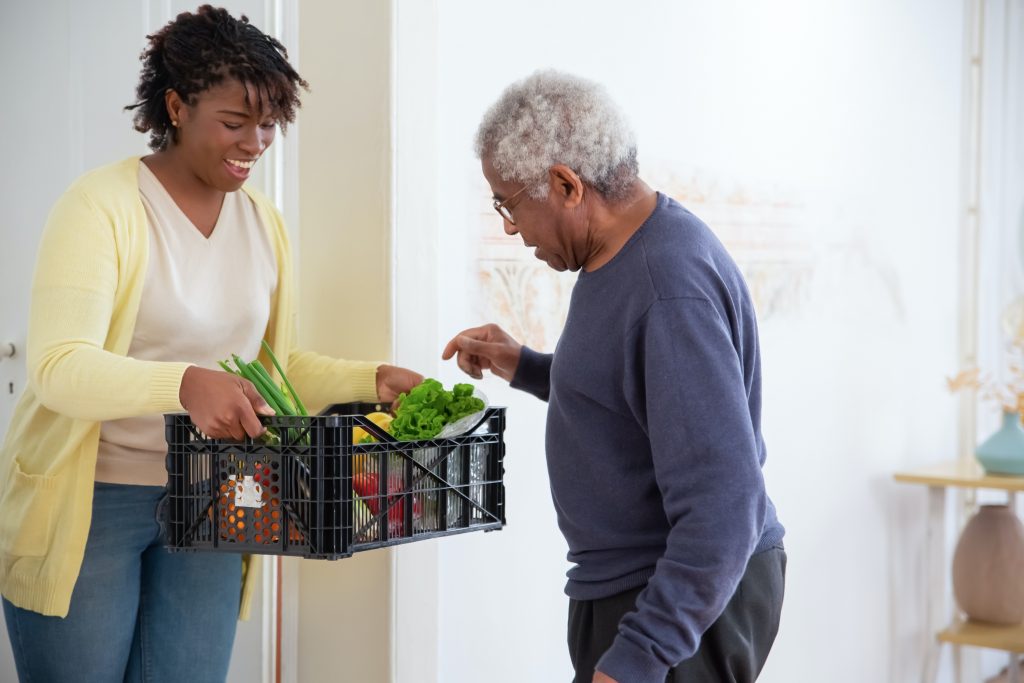Household Assistance
- Cleaning and Organizing
- Performing light housekeeping tasks (dusting, vacuuming, etc.)
- Organizing living spaces
- Laundry
- Washing, drying, folding, and ironing clothes
- Changing bed linens
- Meal Preparation
- Cooking and preparing meals
- Cleaning up after meals
- Shopping and Errands
- Grocery shopping and running errands
- Picking up prescriptions
Day-to-day Chores

We understand why you need extra hands-on-deck:
1. Limited Mobility
As people age or become incapacitated due to illness or disability, their mobility is often reduced. Tasks that involve standing, bending, lifting, or even walking around the house can become difficult or impossible. Household assistance helps them with activities like cleaning, laundry, cooking, and grocery shopping, which they may struggle to perform independently.
2. Chronic Health Conditions
Many elderly or incapacitated individuals suffer from chronic conditions such as arthritis, osteoporosis, heart disease, or respiratory problems. These conditions can make it painful or dangerous for them to handle physically demanding tasks, like cleaning or moving heavy items. Household assistance ensures their home remains safe and comfortable without them exerting themselves.
3. Fatigue and Low Energy
Health conditions, medication side effects, or the natural aging process can lead to fatigue and low energy levels. As a result, the elderly or incapacitated may lack the stamina to keep up with daily household chores. Household assistance provides them with the help they need to maintain a clean and organized living space without overexerting themselves.
4. Cognitive Decline
Cognitive issues such as dementia or Alzheimer’s disease can make it difficult for elderly individuals to manage daily household tasks. They may forget to clean, prepare meals, or handle their home safely. Household assistance provides support in keeping their living environment safe and orderly, while also ensuring that essential tasks, such as turning off the stove or locking doors, are handled properly.
5. Fall Prevention and Safety
The elderly or incapacitated are at greater risk of falls and accidents, particularly when trying to perform tasks like cleaning or reaching for high shelves. Household assistance reduces the risk of injury by providing help with tasks that require physical effort or balancing, keeping the home safe from potential hazards like clutter or spills.
6. Maintaining Independence
Household assistance allows elderly or incapacitated individuals to maintain a degree of independence while staying in their own homes. By receiving help with challenging tasks, they can continue living in a familiar environment without needing to relocate to a care facility, preserving their dignity and sense of autonomy.
7. Healthy Living Environment
A clean and well-maintained home is important for both physical and mental health. Household assistance ensures that the elderly or incapacitated live in a sanitary, safe, and organized environment, which can help prevent infections, allergic reactions, and other health issues. It also promotes a positive mental outlook, reducing stress and anxiety.
8. Meal Preparation
Cooking can be dangerous for elderly or incapacitated individuals due to mobility issues, reduced strength, or cognitive impairments. Household assistance with meal preparation ensures that they receive nutritious meals while minimizing the risk of kitchen-related accidents, such as burns or fires.
9. Emotional Well-Being
Living in a tidy and organized home can contribute to emotional well-being. Clutter or an unclean living environment can cause stress, anxiety, and feelings of helplessness. Having household assistance helps the elderly or incapacitated feel more comfortable and at ease in their own homes, which can boost their mood and quality of life.
10. Support for Caregivers
Family caregivers may not always have the time or ability to manage both caregiving and household duties. Household assistance can relieve caregivers of the burden of these tasks, allowing them to focus on providing emotional support or healthcare, and preventing caregiver burnout.
In summary, household assistance for the elderly or incapacitated is vital for maintaining a safe, healthy, and comfortable living environment. It enables them to continue living independently in their own homes while reducing the physical strain and risks associated with household tasks.
